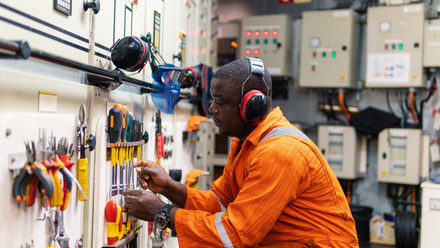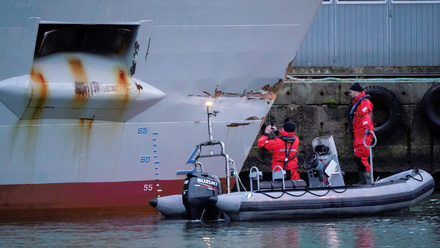Change needed to ensure women can thrive at sea
The maritime industry must evolve its culture to be more inclusive to both women and seafarers, and help improve crew health and safety.
Historically, our industry has been male dominated with systems, facilities and cultures tailored primarily to men. While this is understandable in a historical context, attracting and retaining more women in the industry will futureproof the sector, but requires a shift in perspective and practice. To address diversity, the industry must acknowledge and address the barriers women face, such as workplaces designed without their needs in mind or cultural norms that unintentionally exclude them.
Conducting systematic research into issues, including employment patterns, training opportunities, promoting systems and workplace cultures, can provide valuable insights not just for women but for everyone. Such research can help identify areas where change is needed and how policies and practices can be revised to create a more inclusive environment which will benefit all.
I am proud that some of my research, which includes the three-year MARTHA project on seafarer fatigue and subsequent focus on the impact of the Covid 19 pandemic on seafarers, has informed a selection of decisions at the IMO. Out of the 22 specific areas of the Standards of Training, Certification, and Watchkeeping for Seafarers (STCW Convention) to be reviewed, mental health and addressing training requirements have been deemed a priority. This has brought to the forefront that ship operators need to understand that their crew's working conditions and work patterns at sea can affect overall health and safety. While these are positive movements in the right direction, more needs to be done.

A focus on the crew
Ensuring that seafarers of any gender are well taken care of is a personal matter to me given that my cousin went to sea about 20 years ago and I was worried about the experiences he would face. In fact, seafarers’ employment conditions and welfare were the focus of my PhD at Cardiff University's Seafarers International Research Centre (SIRC) – a move that has fundamentally shaped my career. Not only did it allow me to disseminate knowledge to our industry on how to improve the occupational health and safety condition of crew members, but it also introduced me to Professor Helen Sampson, Director of SIRC. Her passion for seafarer wellbeing is admirable and really inspired me to dig deep into this topic.
Seafarers and their employers often consider fatigue as ‘part of the job’ as the harsh environment at sea requires their constant attention, impacting on their physical and mental wellbeing. By combining insights from other industries with a focus on maritime challenges, my colleagues and I worked to identify the causes of fatigue in seafarers and recommend preventive measures including a fatigue risk management system (FRMS), training and fatigue prediction models in the MARTHA project.
Our recent work comparing the fatigue levels of the maritime workforce during and after the Covid 19 pandemic found that seafarer exhaustion levels, based on the data, were now higher than during the pandemic. This was attributed not only to needing to address any maintenance delayed by the pandemic but also increased inspections from various regulatory bodies such as port state control, governments and companies. Seafarers needed to prepare for these inspections in addition to daily work and were also under pressure to make sure that the vessel passed, resulting in heavier workload and longer working hours. Additionally, salaries returned to pre-pandemic levels as crew travel resumed, but workloads remained at a high.
Embracing change
There are steps that can be taken to improve seafarer wellbeing and safety. Fatigue can lead to costly accidents that can also cause reputational damage to the organisation. I am glad that we are already seeing many shipping companies review their internal processes and management policies to support staff.
On an industry-wide level, transparency between governments, regulatory bodies and industry is key. Clear communication and considerate implementation (i.e. onboard inspections) are essential to avoid increased workloads leading to more stress and anxiety among crews.
The digitalisation of repetitive and mundane tasks allows seagoing and shore-based staff to focus on important tasks but requires an updated training system to upskill staff. The industry should not be afraid of change but should welcome the opportunity to evolve, particularly if the changes being implemented are backed by data and thorough research.
Looking to the future
We have already seen progress, including advancements in technology. which have reduced the reliance on manual labour in our industry and made it more accessible to women. Employment in research, communication, data analysis, and machine operations align with the skills that women often excel in, highlighting the potential for greater female participation.
Encouraging women to choose and remain in a maritime career requires practical support from government, industry organisations and shipping companies. This includes diversified training, inclusive systems and mentorship programmes. Here, too, we need to drive a change in our thinking and culture so that the industry recognises women’s potential and contribution. I believe it is important that women support women, but also that the maritime industry supports women to progress in their careers.
Upon my return to China from the UK, I formed the Seafarers Research Centre at Dalian Maritime University to continue my research on seafarer health and safety. I hope that other researchers – including women researchers – will join me so that our findings will contribute to long-term systemic change by addressing real-world issues. Together we can improve the lives and safety of seafarers.
This interview is part of the Lloyd’s Register Foundation and Lloyd’s Register Rewriting Women into Maritime History initiative - a collaboration with leading maritime organisations to raise the profile of female maritime expertise, experience and leadership, and help promote gender equity, diversity and inclusion.
Image: Dr Zhiwei Zhao, maritime researcher and health and safety advocate
Newsletter image: woman working in the maritime industry; credit: Shutterstock.






